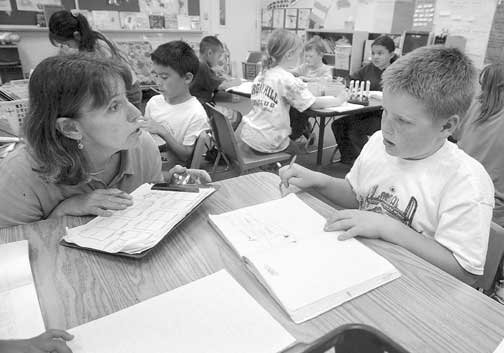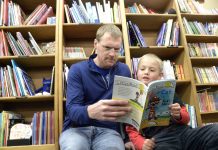Pairing literacy coaches with classroom teachers produces
results
Some say that teachers have the most powerful effect on our children. You might think the same if your child attends one of the Morgan Hill elementary schools participating in the literacy program.
Literacy coaches are pairing with classroom teachers to introduce writing workshops to children in grades K-6. This collaborative method of teaching encourages reading with confidence and writing in various genres like fiction, nonfiction and personal narratives.
In a typical classroom writing workshop, either the literacy coach will teach the class while the teacher observes or vice versa. After the class lesson, the children go off to write independently for about 30 minutes.
While the children are writing, the teacher and the coach confer with each student individually. This one-on-one type of help ensures that each child is working at his or her own level of understanding based upon their needs and what they need to learn next to move forward.
The children are taught to support each other by working in groups, reading drafts of each others writings and giving one another other feedback and help.
After the individual help, there is a sharing time. The children might sit in a circle and listen to the teacher recap the lesson. Then they share examples or read aloud one of their stories.
“That can be the most powerful part of the lesson. The kids are coming up with great examples of what they learn, in turn they inspire each other,” said Laura Schenkelberg, literacy coach at Paradise Valley-Machado and classroom teacher for 22 years.
The literacy program is a part of the Morgan Hill Literacy Coach training program and the Every Child a Reader and Writer initiative that provides ongoing training to teachers.
Both ECRW and the Morgan Hill School District are focused on a balanced literacy program. The district program uses local and state standards, while ECRW uses state and national standards.
“If you want real change to take place, you have to have ongoing staff development,” said Norma Zermeno, district literacy coach, who leads the program and trains the coaches.
ECRW’s main focus is writing, as has been the district literacy program, along with learning how to use the “workshop” format and training teachers how to teach writing and reading.
If a methodology could label this program, “it would be showing and modeling,” said Zermeno.
At Paradise Valley-Machado in Terri Craig’s second grade writers’ workshop, children use a writer’s notebook that becomes a container for many different ideas and thoughts about writing. They also write stories ideas for whatever genre they are studying at the time.
If they are studying nonfiction, they might choose a topic from the animal realm. They enter notes in the writer notebooks as they research, organize information and use subtopic headings.
They are taught to edit their work by first reading through their drafts, circling misspelled words. The teacher has told them that they should recognize words from the readings.
Then they choose a piece of writing they want to publish that is posted on the walls.
“I think this is lifting the level of their engagement across the whole school day,” said Schenkelberg.
Both Zermeno and Schenkelberg believe that it possible to accelerate a child’s learning with good classroom teaching, not just for a child who is behind, but to also challenge capable kids.
“Making this work for every child and keeping all of the children moving along can be challenging,” said Schenkelberg.
Schenkelberg said working with the children individually requires expert understanding on the part of the teacher because it is different from teaching in a classroom where all children do the same work no matter what their level of understanding is.
District Director of Curriculum and Assessment Pat Blanar said that “one shot” staff development doesn’t work and that more in-depth learning happens when there is ongoing coaching on site.
The ECRW initiative is a part of the Noyce Foundation of Palo Alto, which funds teaching and learning programs in public schools; teachers get ongoing professional development and funds for books and materials.
As part of the ECRW initiative, each student must publish a certain minimum number of written pieces by grade level. Then, at the end of the year, ECRW selects a piece that they keep in their own portfolio.
Paradise Valley and Barrett were the first two schools to participate in the ECRW initiative, and then San Martin/Gwinn and P.A Walsh followed. Next year, Los Paseos and El Toro elementary schools are planning to adopt the program.
The staff at Paradise Valley is working towards implementing a writer’s workshop in every classroom. Currently, it is not mandatory that all classroom teachers participate in the program.
“If the classroom teacher does not want a coach, they do not have to have one,” said Zermeno.
James Hamilton, Paradise Valley principal, said the goal is to have every classroom in the district implement the program.
“We recognize that it will take a comprehensive approach and extensive training for the coaches,” said Hamilton.
Blanar said research done by the Noyce Foundation shows a positive upward trend in the children’s writing and even a larger improvement with English Language Learners.
“I am excited that we are using the same model that athletes and doctors use; having coaching, teaching and learning new techniques all the time,” said Blanar.








